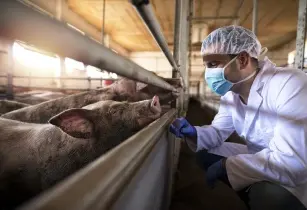The Food and Agriculture Organization of the United Nations (FAO) have gathered in a two-day interactive debate on the field research report workshop for the training of veterinary professionals in field epidemiology (ISAVET)
This workshop, which took place at the headquarters of the Ministry of Animal and Fisheries Resources (MRAH) , was held in semi-face-to-face mode with the jury and the trainees face-to-face in the meeting room and international facilitators (regional and global ISAVET coordinators) in virtual mode, organised by the FAO's Emergency Center for the fight against Transboundary Animal Diseases (ECTAD).
The objective of the workshop was to discuss and critique the research results of the trainees and to receive constructive technical feedback on the veterinary field epidemiology skills developed during the basic ISAVET training.
ISAVET aims to provide "service training" to strengthen, using a multisectoral approach, prevention, detection, early warning, rapid reaction, reporting and response to animal diseases including transboundary, endemic, emerging, and re-emerging ones. ISAVET trainees received, during four months, four weeks of lectures and tutorials , followed by three months of field activities under the supervision of mentors on their place of work.
Research subjects addressed by trainees ISAVET
Several research topics relating to the epidemiology of animal diseases were addressed by the 20 ISAVET trainees (18 veterinary officers from the Ministry of Animal and Fisheries Resources, and two officials from the Ministry of the Environment.
Dr Adama Maïga, the director general of veterinary services, said, “the importance of this training for the reinforcement of the capacities of the surveillance and control of animal diseases and especially the expectations vis-à-vis the agents who have received this training and who are the key players in the field .”
With support from FAO, through ECTAD, the ISAVET initiative fills the need for capacity building and sustainability for the future of the region. Through ISAVET, the capacity of countries to predict, prepare for, respond to and overcome critical threats from emerging infectious diseases and transboundary animal diseases to human and animal health will be enhanced, taking into account the interface between human, animal and environmental health.
The availability of field veterinarians and veterinary paraprofessionals in quantity and quality is essential in the field. This is all the more important as they have close ties to the local community and are often on the front lines in the event of an epidemic. They constitute an essential link in effective surveillance, carrying out field surveys, with a view to emergency interventions.





